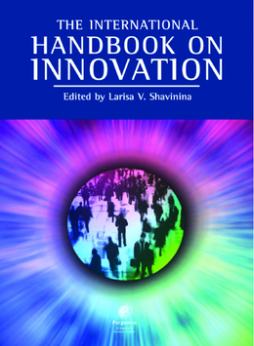
Additional Information
Book Details
Abstract
The International Handbook on Innovation is the most comprehensive and authoritative account available of what innovation is, how it is measured, how it is developed, how it is managed, and how it affects individuals, companies, societies, and the world as a whole. Leading specialists from around the world, responsible for much of the current research in the field, analyze the multidisciplinary and multifaceted nature of innovation, its types and levels, its criteria, its development, its management, its specificity in various domains and contexts, and societal demands on it. They consider innovation from the viewpoints of psychology, management science, business, technology, sociology, philosophy, economics, history, education, art, and public policy.
With contributions from over 90 distinguished authors covering 17 nations, readers will obtain expert insight into the latest research and future developments in the field of innovation. The Handbook will present many facets of innovation including its nature, its development, its measurement, its management, and its social, cultural, and historical context. The breadth of this work will allow the reader to acquire a comprehensive and panoramic picture of the nature of innovation within a single handbook. The reader will develop an accurate sense of what spurs potentially creative and innovative people and companies toward their extraordinary achievements and exceptional performances.
The handbook can be used as a reference source for those who would like information about a particular topic, or from cover to cover either as a sourcebook or as a textbook in a course dealing with innovation. Anyone interested in knowing the wide range of issues regarding innovation will want to read this handbook.
Contributions from over 90 distinguished authors covering 17 nations
International in scope, reflecting global perspectives
Essential reading for researchers and practitioners in the fields of psychology, management science, business, technology, sociology, philosophy, economics, history, education art, and public policy
"...an outstanding compendium about the human knowledge about innovation, which deserves pride of place in the library of any any scholar interested in the advancement of science." —Technological Forecasting and Social Change, Vol. 72, Issue 1, 2005.
"..a timely and monumental tome on innovation research" International Journal of Information Management, June 2004.
"Deserves a place as a reference text for academics, practitioners and policy makers. ... [B]y providing critical questions and outlining new research directions, it makes a welcome addition to the innovation field." Dries Faems, Creativity and Innovation Management, Vol 13, No 2, June 2004.
"Very well compiled in a logical order and there are ample ideas and framework for research on various facets of innovation in a variety of situations." K. Narasimhan, TQM Magazine, Vol 16, No 4, 2004
Larry R. Vandervert, American Nonlinear Systems
"I have no doubt that the volumes will galvanize and guide the study of innovation for the next decade."
Joseph Renzulli, University of Connecticut
"This is really a comprehensive and innovative undertaking."
George Swede, Ryerson Polytechnic University
"...should be the defining work for decades."
David Perkins, Harvard Graduate School of Innovation, USA
"From the first campfire and arrowhead, the human condition has advanced through innovation. The International Handbook on Innovation examines with third-millenium savvy the fundamentals of innovation from the neuron all the way up to large-scale social enterprises.
Innovation is a challenging theme, interpretable in so many different ways. If there's one resource I'd reach for, it's the author-rich and perspective-rich International Handbook on Innovation. "
Ronald Goldsmith, Richard M. Baker Professor of Marketing, Florida State Univ.
"The International Handbook on Innovation has been sorely needed; it will remain a comprehensive and essential resource for years."
